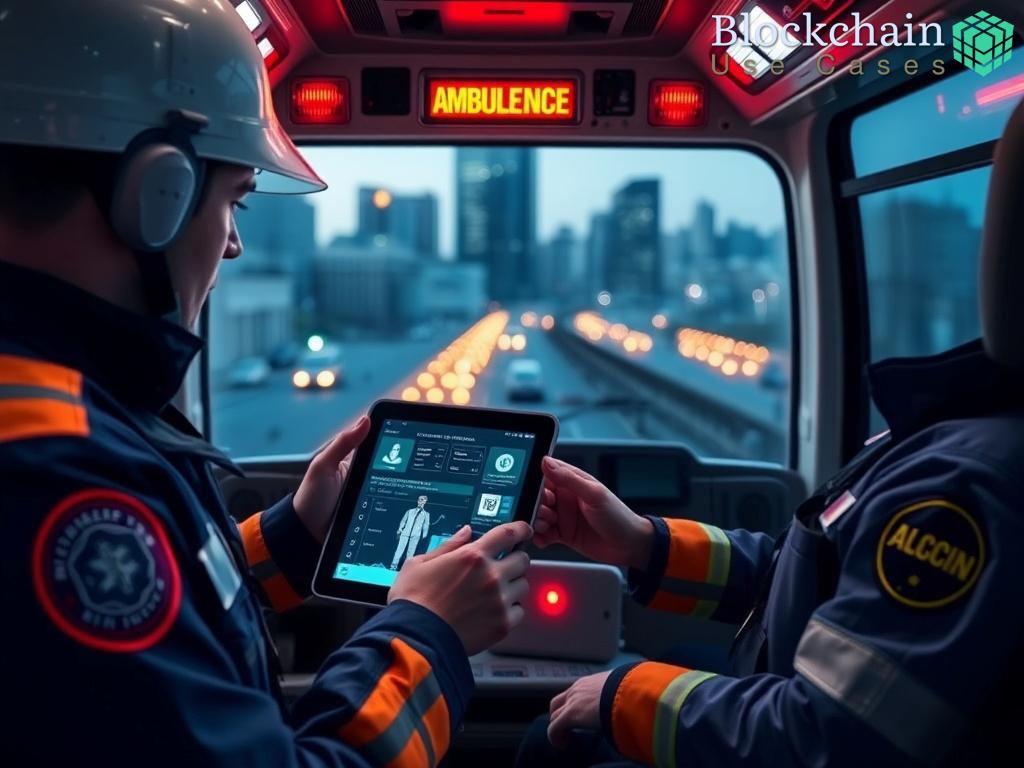Overview of Decentralized Patient Transportation Models
The healthcare sector is undergoing a transformation as decentralized platforms emerge to address the logistical challenges of patient transportation. These models leverage technology to streamline operations, enhance patient experiences, and reduce costs. By decentralizing transportation logistics, healthcare providers can create more efficient systems that are responsive to the unique needs of patients and medical facilities.
Understanding Decentralized Transportation Models
Decentralized patient transportation models utilize a network of independent transport providers and innovative technology to facilitate the movement of patients. Unlike traditional centralized systems, which often involve a single entity managing all transportation, decentralized models allow for multiple stakeholders to collaborate, creating a more flexible and scalable approach. This paradigm shift is poised to improve patient access to care while optimizing resource allocation.
Key Benefits of Decentralized Transportation Systems
The implementation of decentralized transportation systems in healthcare provides numerous advantages. These benefits not only enhance patient satisfaction but also improve operational efficiency. Below is a detailed list of the primary benefits associated with these models:
- Increased Accessibility: Patients can access transportation services tailored to their specific needs.
- Cost Efficiency: Reduces overhead costs associated with maintaining a centralized fleet.
- Improved Coordination: Facilitates better communication between patients, transport providers, and healthcare facilities.
- Data-Driven Insights: Utilizes analytics to optimize routes and improve service delivery.
- Enhanced Patient Experience: Reduces waiting times and provides seamless transportation solutions.
The Future Landscape of Patient Transportation
As decentralized platforms continue to evolve, we can expect significant advancements in patient transportation logistics. Emerging technologies such as blockchain, artificial intelligence, and mobile applications are set to further enhance the efficiency and reliability of these systems. The integration of these technologies will not only streamline operations but also ensure that patient data remains secure and accessible. The future of patient transportation will likely see a more interconnected ecosystem, where patients, healthcare providers, and transport services work in harmony to deliver exceptional care.
Technological Innovations in Logistics Management

Revolutionizing Transportation through Technology
The landscape of patient transportation logistics is being reshaped by rapid technological advancements that are making these systems more efficient and patient-centered. Innovations such as real-time tracking, automated scheduling, and data analytics are not merely enhancements; they are fundamental shifts that redefine how logistics management operates within the healthcare sector. These technologies facilitate greater transparency and accountability in operations, ultimately leading to improved patient experiences during their journey to care.
Integration of Advanced Technologies
One of the most significant technological innovations is the integration of artificial intelligence (AI) in logistics management. AI algorithms can analyze vast amounts of data to predict demand patterns, optimize routes, and manage resources effectively. This ensures that transport providers can respond swiftly to fluctuating patient needs. Additionally, mobile applications have become indispensable tools in this ecosystem, enabling patients to book rides easily, access real-time updates, and communicate directly with transport providers. Such interfaces not only enhance user engagement but also empower patients by giving them control over their transportation options.
Enhancing Security and Efficiency
The incorporation of blockchain technology is another game-changer in patient transportation logistics. By creating a decentralized and tamper-proof record of all transactions and movements, blockchain enhances the security of patient data, ensuring compliance with healthcare regulations while fostering trust among stakeholders. Furthermore, emerging technologies like Internet of Things (IoT) devices allow for continuous monitoring of vehicles and equipment, ensuring that they are in optimal condition and reducing the likelihood of delays caused by mechanical failures. As these innovations interconnect, they create a robust framework that not only streamlines operations but also prioritizes patient safety and satisfaction.
| Technology | Benefit | Impact on Logistics |
|---|---|---|
| Artificial Intelligence | Predictive analytics and route optimization | Increases operational efficiency and responsiveness |
| Mobile Applications | User-friendly booking and real-time tracking | Improves patient engagement and satisfaction |
| Blockchain | Enhanced security and data integrity | Builds trust and compliance in logistics |
| IoT Devices | Continuous monitoring of vehicles | Reduces delays and improves reliability |
As the healthcare industry embraces these technological innovations, it becomes evident that decentralized platforms for patient transportation will not only improve the logistics management of patient journeys but also contribute significantly to the overall quality of care. The synergy between technology and healthcare logistics is set to enhance accessibility, efficiency, and ultimately, the patient experience.
Challenges and Solutions in Decentralized Systems
Identifying the Key Challenges
As the adoption of decentralized platforms for patient transportation continues to gain momentum, it is imperative to address the challenges that accompany this innovative approach. These systems, while promising enhanced efficiency and improved patient experiences, also face several hurdles that could hinder their successful implementation. Identifying these challenges is the first step toward devising effective solutions.
- Coordination Among Multiple Stakeholders: Decentralized systems often involve various transport providers, healthcare facilities, and patients. This multiplicity can lead to coordination difficulties, resulting in communication breakdowns and inefficiencies.
- Standardization of Services: With numerous independent providers, maintaining a consistent quality of service can be challenging. Variations in service levels can impact patient satisfaction and trust in the transportation system.
- Data Privacy and Security Concerns: As patient data is shared across multiple platforms and stakeholders, the risk of data breaches increases. Ensuring compliance with regulations such as HIPAA is crucial.
- Technology Adoption and Integration: Not all stakeholders may be equally adept at using advanced technologies. Resistance to change can impede the smooth functioning of decentralized models.
Strategizing Effective Solutions
Tackling the challenges identified in decentralized patient transportation requires strategic planning and innovative solutions. By focusing on collaboration, technology integration, and patient engagement, stakeholders can create a robust framework that enhances the overall logistics management.
- Enhanced Communication Platforms: Developing integrated communication tools that facilitate real-time updates and information sharing among all stakeholders can improve coordination and response times.
- Service Level Agreements (SLAs): Establishing clear SLAs between transport providers and healthcare facilities ensures that all parties adhere to a consistent standard of service, thereby enhancing patient satisfaction.
- Robust Data Security Protocols: Implementing advanced encryption methods and access controls can safeguard patient data. Regular audits and compliance checks should be conducted to ensure adherence to privacy regulations.
- Training and Support Programs: Providing comprehensive training for all stakeholders on the use of technology platforms encourages adoption and maximizes efficiency. Continuous support can ensure they remain proficient.
Building a Sustainable Future
By addressing the challenges associated with decentralized patient transportation through innovative solutions, the healthcare sector can foster a more efficient and patient-centered logistics environment. The combination of enhanced communication, standardized services, and robust security measures will not only improve operational efficiency but also significantly elevate the patient experience. With these strategies in place, decentralized platforms can achieve their full potential, paving the way for a future where patient transportation is not just a logistical necessity but a seamless part of the healthcare journey.
Impact on Patient Outcomes and Satisfaction
The shift towards decentralized platforms in patient transportation is not merely a logistical transformation; it is a paradigm shift that significantly influences patient outcomes and overall satisfaction. By leveraging technology and fostering collaboration among numerous stakeholders, these models enhance the patient experience, making healthcare more accessible and efficient. Understanding the multifaceted impact of decentralized systems on patient care is essential for stakeholders aiming to optimize their services.
Enhancing Accessibility and Timeliness
One of the most substantial benefits of decentralized patient transportation is the improved accessibility it offers to patients. With a network of independent transport providers, patients can find services that are tailored to their specific needs, reducing barriers to care. This is particularly vital for individuals with mobility issues or those living in rural areas. Quick access to timely transportation leads to minimal delays in receiving care, which is critical for health outcomes, especially in emergency situations.
Personalized Patient Experiences
Decentralized platforms enable a more personalized approach to patient transportation. Through data analytics and real-time tracking, providers can cater to individual preferences, such as choosing the type of vehicle or scheduling rides at convenient times. This level of personalization not only fosters a sense of control and empowerment among patients but also enhances their overall satisfaction with the healthcare experience. By engaging patients in their transportation decisions, these platforms contribute to better adherence to medical appointments and treatment plans.
Key Advantages of Decentralized Transportation Models
To fully appreciate the impact of decentralized transportation systems on patient outcomes, it is essential to examine the advantages they bring:
- Improved Communication: Enhanced communication tools bridge the gap between patients, transport providers, and healthcare facilities, ensuring that all parties are informed and coordinated.
- Reduced Wait Times: With efficient scheduling and routing, patients experience shorter wait times, leading to increased satisfaction and better health outcomes.
- Increased Trust: Transparency in operations fosters trust among patients, encouraging them to utilize transportation services without hesitation.
- Better Health Outcomes: Timely transportation to appointments can lead to improved health outcomes, particularly for chronic disease management and follow-up care.
As the healthcare industry continues to embrace decentralized platforms for patient transportation, the positive impact on patient outcomes and satisfaction will only grow. By ensuring that patients receive timely, personalized, and efficient transportation, these innovative models represent a crucial step towards achieving comprehensive, patient-centered care.
Future Trends in Patient Transportation Logistics
The landscape of patient transportation is on the brink of a monumental shift, with decentralized platforms leading the charge toward a more efficient, accessible, and patient-centric logistical framework. As healthcare systems embrace innovative technologies and collaborative models, the future of patient transportation logistics is poised to undergo significant transformations that promise to enhance both patient experiences and operational efficiency.
Increased Interconnectivity Through Smart Technologies is set to redefine how patients and transport providers interact. The integration of Internet of Things (IoT) devices will facilitate real-time monitoring and communication, allowing for seamless coordination between patients and transport services. Imagine a scenario where a patient’s health data, including mobility needs and appointment schedules, is automatically shared with transport providers, ensuring that the right resources are allocated precisely when needed. This level of interconnectivity will not only streamline operations but also empower patients by keeping them informed and engaged throughout their transportation journey.
The rise of Artificial Intelligence (AI) will further revolutionize logistics management in patient transportation. By harnessing advanced algorithms and data analytics, AI can predict demand fluctuations and optimize routing in real-time, ensuring that transport services are not just responsive, but proactive. Such advancements will likely lead to a significant reduction in wait times and an increase in overall service reliability, directly impacting patient satisfaction and health outcomes.
Moreover, the future of patient transportation logistics will heavily rely on collaborative ecosystems. As decentralized models evolve, partnerships among various stakeholders—including hospitals, healthcare providers, and independent transport services—will become increasingly vital. This collaborative approach will facilitate shared resources, allowing for more comprehensive service offerings that cater to the diverse needs of patients. By fostering a culture of collaboration, healthcare systems can create a robust infrastructure that prioritizes patient-centric solutions while optimizing operational costs.


















